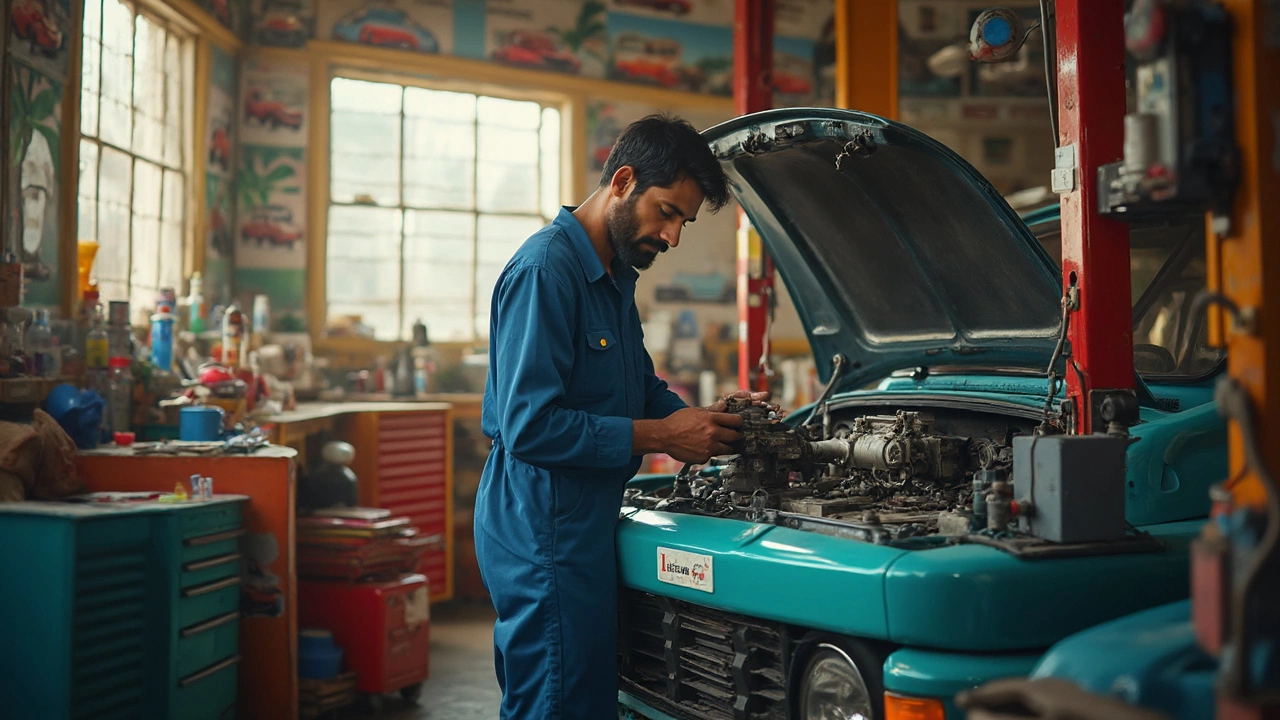What Burns Up Fuel Pumps?
 Feb, 22 2025
Feb, 22 2025
Ever wondered what really happens to those fuel pumps when they give out? It’s not always about bad luck. There are some usual suspects like dirt, rust, and even our own driving habits that can quietly sabotage this crucial vehicle component.
First off, running on empty isn’t just a risky game for your peace of mind. It heats up the fuel pump since gasoline also acts as a coolant. So, keeping your tank at least a quarter full can do wonders.
Bad fuel is another sneaky adversary. Low-quality or contaminated fuel can carry dirt and grit into your pump, causing blockages or wear. Think of it as feeding junk food to the pump—it’s not gonna end well.
Let’s not forget the role of constant short trips and city driving. Stop and go conditions can speed up wear and tear faster than you’d believe. Being aware of these factors can significantly extend the life of your fuel system.
- Common Causes of Fuel Pump Failures
- Impact of Driving Habits
- Signs of a Failing Fuel Pump
- Tips to Prolong Fuel Pump Life
Common Causes of Fuel Pump Failures
When a fuel pump fails, it can feel like your car just dropped out of a race. But what exactly knocks these pumps out of action? A few usual culprits are more responsible than you'd think.
Running on Empty
One of the top offenders is consistently driving with a low fuel tank. The fuel in your tank has the job of keeping the pump cool. When you run on empty often, you're running the risk of overheating the pump, leading to early failure.
Clogged Fuel Filters
Another common issue is a clogged fuel filter. If fuel filters are left unchecked, they can choke out your fuel pump by restricting the fuel flow, forcing the pump to work harder than it should.
Poor Quality or Contaminated Fuel
Fuel quality matters more than you might think. Fuel mixed with water, dirt, or debris can wreak havoc inside the pump. Over time, this can cause the pump's parts to grind down, leading to failure.
Electrical Issues
Electrical problems like a faulty relay or bad wiring can prevent adequate power from reaching the pump. This isn't something drivers usually think about until the pump stops working—usually without much warning.
Age and Wear
Much like any other car part, fuel pumps don’t last forever. Over time, they naturally wear out. However, regular maintenance can help extend their lifespan significantly.
Keeping tabs on these factors and doing some preventative maintenance can really spare you from stranded moments. Know these culprits, and you'll protect your ride in the long run!
Impact of Driving Habits
Did you know that the way you drive can play a big role in how long your fuel pump lasts? It’s true. Driving habits aren’t just about saving on gas; they're also about sparing your vehicle from unexpected breakdowns.
Running on Empty
Let's start with running your tank low. This not only stresses the pump by having it work harder to pull fuel but also reduces its cooling effect. So next time you’re tempted to push for the last mile on a nearly-empty tank, remember it's doing more harm than good.
Stop-and-Go Traffic
Driving in constant stop-and-go traffic is another habit that can speed up wear. The frequent stops mean your fuel system has to start and stop more often, putting additional strain on the pump and potentially leading to earlier failure.
"It's crucial to maintain good driving habits to extend the lifespan of essential vehicle components like the fuel pump," says Tony Brown, an automotive expert at CarTech Magazine.
Hard Acceleration
Jumping on the gas pedal like you're in a race? It's fun but can also overwork your fuel pump. Sudden spikes in demand make the pump work harder to keep up with fuel supply.
Long-Term Idling
Think having the car idling doesn't count as driving? Well, it contributes significantly to pump wear. Prolonged idling can strain the fuel system over time, and you might not even realize it’s happening.
To summarize, consider how your habits may be impacting your ride. Small tweaks, like avoiding low fuel situations and easing up on the pedal, can not only save money but also keep your vehicle in top shape longer.

Signs of a Failing Fuel Pump
Is your car feeling a bit sluggish lately? It might be a hint that your fuel pump is on the fritz. But what should you look out for?
1. Engine Sputtering
If your engine starts sputtering when you’re cruising at high speeds, it can be one of the earliest signs. When the fuel pump's not delivering fuel steadily, the engine misbehaves.
2. Power Loss
Notice any power loss when you’re going uphill or hauling a load? That’s a classic sign that the fuel pump isn’t up to its full potential.
3. Difficulty Starting
Struggling to get your engine started is frustrating, for sure. A failing pump might not provide enough fuel pressure to start your vehicle effectively.
4. Unexpected Engine Stalling
If your engine randomly stalls, especially during a drive, don't panic just yet but consider your fuel pump a suspect. A weak pump could be the culprit behind these surprises.
- Key Tip: Pay attention to how often this happens—it could escalate quickly.
5. Drop in Fuel Efficiency
Ever noticed that you’re burning through fuel way faster than before? An inefficient fuel pump can lead to inconsistency in fuel supply, affecting your vehicle’s fuel efficiency.
6. Strange Noises
Listening to your car is never a bad idea. A whining noise coming from the fuel tank area is another indication that something isn’t quite right.
| Common Symptom | Possible Cause |
|---|---|
| Engine Sputtering | Irregular fuel delivery |
| Trouble Starting | Low fuel pressure |
| Whining Noise | Damaged pump components |
If you’re nodding along recognizing these symptoms, it might be time for a proactive check-up. Don’t just wait it out; addressing these issues early on can save a lot of headaches—and cash—down the road.
Tips to Prolong Fuel Pump Life
Keeping your fuel pump in good shape isn’t just about regular check-ups—there are simple habits that can go a long way. Let’s break it down.
Keep Your Tank Full(er)
It's tempting to run the tank to its last drop, but aim to keep it above a quarter full. Why? Fuel acts as a coolant, and running low constantly can make the pump overheat and wear out quicker.
Avoid Contaminated Fuel
Not all fuel is created equal. Try fueling up at reputable stations where they tend to have better storage and filtration systems. Even better, add a bottle of fuel injector cleaner every few months to keep things running smoothly.
"More than 13% of fuel-related problems come down to contaminated fuel," says Jenna Walters, an automotive engineer with over 15 years of experience.
Mind Your Driving Habits
Frequent short trips and stop-and-go conditions sooner wear down your pump. Should you change your route or combine errands to minimize stress? Absolutely.
Regular Filter Checks
Your fuel filter is the unsung hero here. Clogs make the pump work harder. Changing the filter based on your car's recommended schedule can keep your vehicle repair needs down.
Consider the Big Picture
It might be easy to overlook, but sometimes, an older or struggling fuel pump needs replacing. Think of it as investing in the health of your vehicle, preventing a breakdown when you least expect it.